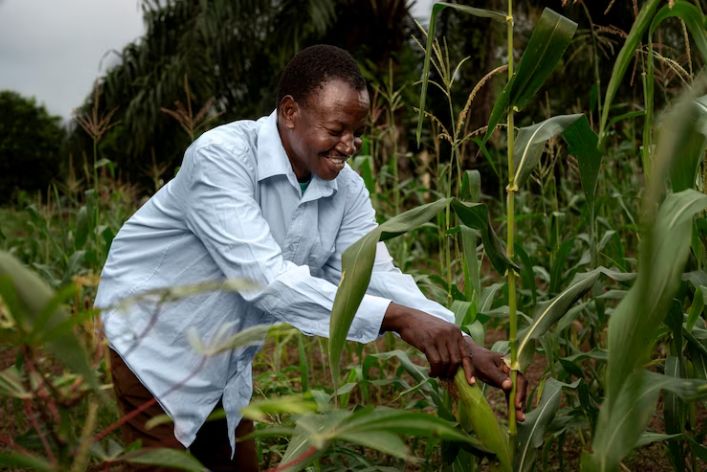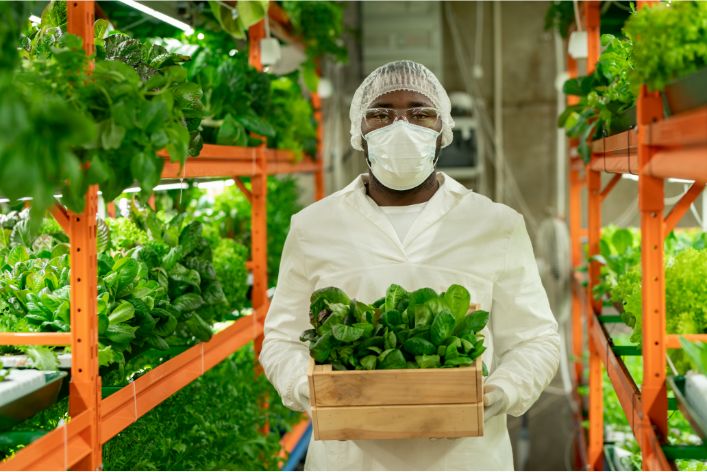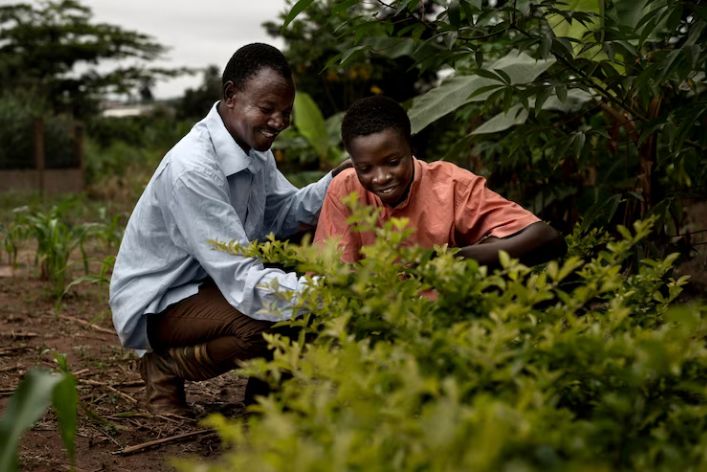Introduction
Sustainable agriculture refers to a farming system that ensures the long-term productivity of land. It involves the use of environmentally friendly practices to maximize productivity while reducing negative impacts on the environment.
In Nigeria, sustainable agriculture is critical to achieving food security and economic growth. With a population of over 200 million people, Nigeria needs a sustainable agricultural system to meet the growing demand for food and prevent environmental degradation.
This post aims to educate readers about careers in sustainable agriculture in Nigeria and why pursuing a career in this field is a viable option.
Sustainable agriculture presents numerous opportunities for individuals interested in making a positive impact on society while pursuing a fulfilling career.
It offers an opportunity for individuals to work towards the attainment of a food-secure Nigeria while making a living.
The post is also intended to encourage and inspire young Nigerians to explore careers in sustainable agriculture.
As Nigeria seeks to diversify its economy and reduce its dependence on oil, the agricultural sector presents immense opportunities for growth and development.
Sustainable agriculture is a critical pillar of the agricultural sector, and a career in this field holds significant prospects for young people.
In general, sustainable agriculture is crucial for Nigeria’s economic growth and food security. Pursuing a career in sustainable agriculture presents an opportunity to promote environmentally friendly farming practices, contribute to the attainment of food security, and build a fulfilling career.
This post aims to educate and inspire young Nigerians to consider careers in sustainable agriculture.
Read: Making a Living: Poultry Farming Careers in Nigeria
Understanding Sustainable Agriculture
Define Sustainable Agriculture
Sustainable agriculture is a farming system that focuses on producing food in a way that is environmentally friendly, socially responsible, and economically viable.
It is a holistic approach to agriculture that seeks to safeguard ecological systems while meeting the needs of farmers and consumers.
Explain the Principles of Sustainable Agriculture
The principles of sustainable agriculture include:
- Minimizing the use of synthetic chemicals and fertilizers
- Conserving soil, water, and other natural resources
- Promoting biodiversity and ecosystem health
- Reducing greenhouse gas emissions and fostering climate resilience
- Respecting animal welfare and promoting ethical livestock management
- Ensuring fair labor practices and supporting rural communities
Discuss the Benefits of Sustainable Agriculture
Sustainable agriculture offers numerous benefits to both farmers and consumers. These include:
- Improved soil health and fertility
- Reduced environmental pollution and degradation
- Enhanced biodiversity and ecosystem services
- Increase in crop yields and resilience to climate change
- Improved animal welfare and human health
- Promotion of sustainable rural livelihoods and development
All in all, sustainable agriculture provides a pathway to a more equitable, resilient, and sustainable food system. It also presents a range of careers and opportunities for young people looking to make a positive impact on the environment and society.
For instance, you can become a sustainable agriculture consultant and help farmers adopt sustainable practices that enhance the quality of their produce and protect the environment.
Alternatively, you can become an eco-entrepreneur and start your own sustainable food-based business, such as a community-supported agriculture (CSA) program or an organic food store.
Other careers in sustainable agriculture include green marketing, sustainable supply chain management, food policy analysis, agricultural research and development, agro-forestry, and sustainable agritourism.
Generally, sustainable agriculture provides an exciting and meaningful career path for those interested in creating a more just and sustainable food system.
By embracing the principles of sustainability and working towards a more equitable and sustainable future, we can build a brighter world for ourselves and future generations.
Read: Essential Guide to Crop Farming Jobs in Nigeria
Challenges Facing Agriculture in Nigeria
Agriculture is an important sector in the Nigerian economy, but it is faced with numerous challenges that affect its productivity and contribution to the country’s economic growth. Below are some of the major challenges that Nigerian agriculture is grappling with:
- Poor infrastructure: Poor infrastructure hampers farmers’ transportation and access to credit due to the state of roads and power supply.
- Limited access to credit: Farmers struggle to secure loans for inputs and equipment, facing limited access to credit.
- Inadequate research and development: Agriculture lacks adequate research and development, hindering farmers from improving yields and productivity.
- Climate change: Climate change disrupts agriculture with erratic weather, floods, and natural disasters affecting crop yields and livestock.
- Pest and disease outbreaks: Crop and animal diseases pose challenges, causing productivity and income losses for farmers.
- Land tenure system: The complex land tenure system in Nigeria makes it difficult for farmers to access land for farming.
- Low level of mechanization: Nigerian agriculture suffers from a low level of mechanization, limiting productivity and efficiency.
Challenges significantly affect Nigerian agriculture, hampering productivity and potential. Poor infrastructure, limited finance, and inadequate research contribute to low yields and poor-quality produce.
Climate change, disease outbreaks, and lack of mechanization worsen farmer’s difficulties in meeting demands and fostering economic growth.
Land tenure disputes further compound challenges, hindering farmers’ access to necessary farming land.
Agriculture plays a crucial role in Nigeria’s economy, contributing to GDP and providing employment for millions.
The implications of declining agricultural productivity are severe for economic growth and overall development.
Addressing challenges requires concerted efforts and investment. Government and stakeholders must take concrete steps to unlock agriculture’s potential and drive economic growth.
Read: Key Agricultural Professions: Boosting Nigeria’s Economy

Careers in Sustainable Agriculture
Sustainable agriculture offers a variety of career opportunities for individuals who are passionate about creating a positive impact on the environment and food systems.
Here are some of the careers available in sustainable agriculture:
- Agricultural Scientist: Agricultural scientists research and develop sustainable practices, requiring a background in agricultural or environmental science.
- Sustainable Agriculture Educator: Sustainable agriculture educators teach and consult on sustainable farm management, needing excellent communication and teaching skills.
- Sustainability Coordinator: Sustainability coordinators develop and implement sustainability programs for agricultural entities, requiring organizational skills and leadership ability.
- Food Systems Analyst: Food systems analysts assess the impact of food systems on communities, producing reports and recommendations for improvement.
- Organic Farmer: Organic farmers raise crops and livestock following organic standards, utilizing knowledge in organic farming practices.
- Agroforester: Agroforesters combine trees with crops and livestock, applying agroforestry techniques and environmental sustainability knowledge.
To pursue a career in sustainable agriculture, a combination of technical, personal and professional skills is required. These include:
- Technical Skills: Understanding of sustainable agriculture practices, agribusiness management, soil fertility, plant genetics, and integrated pest management.
- Personal Skills: Excellent communication skills, self-motivation, adaptability, problem-solving, and critical thinking.
- Professional skills: Project management, leadership, and marketing skills are crucial for sustainable agriculture careers, especially for those working in the private sector.
Nigeria must promote sustainable agriculture for food security, economic growth, and environmental conservation. Sustainable practices reduce erosion, pollution, and emissions while preserving biodiversity.
All stakeholders, including farmers, policymakers, organizations, and the private sector, must collectively promote sustainable agriculture.
Key actions to promote sustainable agriculture in Nigeria include the following:
- Increasing public awareness of sustainable agriculture practices and their benefits
- Promoting government policies that support sustainable agriculture practices and smallholder farmers
- Encouraging the use of renewable energy in agriculture
- Encouraging farmers to adopt Climate Smart Agriculture (CSA) practices
- Providing financial support and incentives for farmers to adopt sustainable agriculture practices
Sustainable agriculture careers enable individuals to positively impact the environment and food systems, offering fulfillment and rewards.
These careers demand technical, personal, and professional skills, making the promotion of sustainable agriculture practices crucial for Nigeria’s agricultural future.
Opportunities in Sustainable Agriculture
Sustainable agriculture offers a plethora of opportunities for individuals and the economy at large. Here are some of the opportunities in sustainable agriculture:
Agribusiness
Agribusiness is a vast and diverse industry that encompasses the entire life cycle of agriculture, from production to consumption.
With sustainable agriculture practices, there is an increased demand for organic food, and this presents a lucrative opportunity for entrepreneurs to create a value chain that meets this demand.
Agroforestry
Agroforestry involves planting trees alongside crops in a farming system. This system provides an increase in crop yield, improves soil fertility, and provides a habitat for wildlife.
It also has the potential to create job opportunities in the agricultural sector, which could help reduce rural-urban migration.
Aquaculture
Aquaculture is the farming of aquatic plants and animals. It offers a significant opportunity for individuals interested in sustainable agriculture to venture into an industry that has enormous potential.
As a result of the growth of the middle class, there is an increase in demand for quality fish in Nigeria and across the globe, presenting a unique opportunity to develop a sustainable aquaculture industry in Nigeria.
Value addition and processing
The value chain in agriculture requires processing and adding value to raw materials. The practice of value addition and processing from crops, livestock, and fish could lead to an agro-processing industry.
This would help create jobs while ensuring that food products produced in Nigeria meet international standards – thus boosting trade.
Research and Development
Sustainable agriculture encourages research and development in various areas such as seed multiplication, animal breeds’ improvement, plant breeding and post-harvest technics development.
This creates job opportunities for researchers and contributes to technological advancement in the agricultural sector. This knowledge can be transferred to farmers to implement better practices.
Export Market
Nigeria has an abundance of natural resources, including agricultural products such as cocoa, yam, and cashew nuts.
The country has the potential to explore the export market, where it can generate foreign exchange while boosting the local economy by creating employment, generating wealth, and developing infrastructure.
Ecotourism
Ecotourism is a sustainable agriculture practice that provides visitors with a unique experience of natural attractions and ecosystems. Nigeria’s breathtaking scenery of fertile farmland, diverse wildlife, and clean air makes it a perfect destination for both local and foreign tourists.
The tourism industry employment potential, creates opportunities for farm visits, educational tours and training which give farmers new ideas and opportunities to profit from their farm while improving their system sustainably.
In essence, sustainable agriculture presents an opportunity for entrepreneurs to venture into a sector that has enormous potential to boost the Nigerian economy, provide employment opportunities for individuals, and contribute to poverty reduction and food security.
It requires the collective effort of all stakeholders- from research institutions and practitioners to policymakers and consumers, to ensure that the Nigerian agricultural landscape is transformed sustainably.
Read: Paving Your Career Path: Agribusiness Roles in Nigeria
Discover More: Agricultural Policies Impacting Nigerian Farmers
Find Out More: Insight into Nigeria’s Agricultural Education Careers
Conclusion
As we come to the end of this blog chapter, it is essential to recap the importance of sustainable agriculture in Nigeria. The agricultural sector is one of the crucial sectors driving the Nigerian economy, and a transition to sustainable agriculture is vital for the country’s progress.
Moreover, pursuing a career in sustainable agriculture has numerous benefits. Individuals can contribute to the development of sustainable agriculture practices that are both environmentally friendly and socially beneficial. This sector offers opportunities for growth, innovation, and creativity with an aim to improve the community.
On a final note, I encourage Nigerians to explore career opportunities in sustainable agriculture. The agricultural sector is expanding, and there is a need for skilled and passionate individuals who can drive Nigeria towards sustainable growth. Let us come together in creating a sustainable future for our country and future generations.




